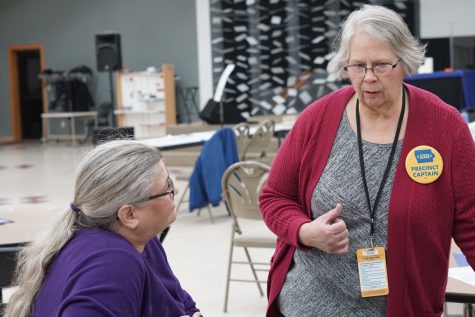A Brief Explanation of the Iowa Caucus
As a mainstay of the United States election process, the Iowa Caucus attracts thousands of politicians, reporters, and voters’ attention to the Midwest. But what even is the Iowa Caucus, and why is it important?
How does a Caucus work?
- Every four years, Iowans gather in public places, like libraries or school gyms, to choose a nominee for their political party
- Caucus-goers physically put themselves in groups advocating for each candidate depending on who they support
- Elected precinct-leaders count votes to decide which candidates should get delegates
- If a candidate does not get at least 15 percent of the vote, their campaign is no longer “viable” and supporters must re-align and pick their second choice candidate
Denise Estrada, precinct leader for candidate Pete Buttigieg, tries to persuade a voter from a non-viable campaign to join the Buttigieg group. “At this point, we have to band together to get Trump out of office. It’s more important than the minuscule details,” Estrada explained on why she tries to get new people on her side. (Ava Kitzi)
What happened this year?
- Because President Donald Trump will run as the incumbent in the 2020 general election, all eyes were on the Democratic race
- Six Democratic frontrunners made a big showing leading up to the Caucus
- Former Vice President Joe Biden
- Massachusetts Senator Elizabeth Warren
- South Bend, Indiana mayor Pete Buttigieg
- Vermont Senator and 2016 candidate Bernie Sanders
- Entrepreneur Andrew Yang
- Minnesota Senator Amy Klobuchar
- Winning Iowa is a big deal in the political world because it often catapults the winner to the top of the polls
- Seven of the past nine Iowa Caucus winners have gone on to win their party’s nomination
How did the Caucus turn out?
- President Trump secured a win in the Republican primary by a landslide with 97 percent of the vote
- Democratic precinct leaders, strong advocates for a single candidate, showed up to caucus locations early to set up
Caucus proceedings proved to be especially intricate this year after the Iowa Democratic Party (IDP), the body in charge of organizing the event, set new rules. “Alright, do we need to go over bathroom procedures?” Keokuk, IA Precinct Six Caucus Leader Don Gould asked.
- The new system of reporting precinct delegate votes experienced multiple problems, resulting in extreme delays
- The Iowa Democratic Party implemented a new result-reporting app that reportedly experienced coding issues that produced statistical errors
- Relying heavily on the app, only “a dozen or so” phone-in lines were available to precinct leaders, a IDP spokesperson explained
- Even with zero percent of results being reported, each of the top five candidates gave victorious speeches
- “(we) stepped on that plane victorious on our way to New Hampshire,” Mayor Buttigieg declared on Monday night
- IDP Chairman Troy Price delivered a statement on Feb 4 apologizing for the mistake and promised to get all results released as soon as possible
- In response to questions of his future as chairman, Price explained that he would consider stepping down after the 2020 election
- As of Feb 7 with 99 percent of precincts reported, Mayor Buttigieg has a lead of 26.2 percent, narrowly winning over Senator Sanders, who garnered 26.1 percent of delegates
- Buttigieg’s victory marks the first time an openly-gay man has ever won any delegates in a primary election
- Senator Warren comes in third place with 18 percent of delegates
What do Iowans think of the Caucus?
- “I get a lot of phone calls,” Keokuk, Iowa High School senior Olivia Smith said, laughing. “Even the people that I’m going to support in the caucus, I’ve had to block everyone because it interrupts class and stuff.”
- Keokuk High School senior Cameron Muston says that living in Iowa has given him a unique opportunity to be involved in politics. He has attended multiple campaign events and takes picking the candidates he supports very seriously
- “I definitely feel like living here has made me more politically active. Not because I find it fun, but because I know it’s my duty,” Muston explained.
- Many Iowans claim that they can get caught up in the results.
- “Lots of people complain and gripe about not having the president they want, but I say if you don’t vote, you can’t bicker,” Gregry Morton, 89, explained.
- Some teens coming of voting-age feel immense pressure to be involved and make the right decisions
- “This time around is way different. I realize now that what I do with my right to vote really matters and I need to use it as much as I can,” Schylar Grisham, 18, admitted. “In 2016, I didn’t really care because I wasn’t old enough to vote. But now that I’ve seen how the past three years have panned out, I know that I need to be active if I want change.”

- “This time around is way different. I realize now that what I do with my right to vote really matters and I need to use it as much as I can,” Schylar Grisham, 18, admitted. “In 2016, I didn’t really care because I wasn’t old enough to vote. But now that I’ve seen how the past three years have panned out, I know that I need to be active if I want change.”
The Iowa Democratic Party said in a statement that reported Caucus results are secure and accurate, but members of the media, pundits, and voters viewed the night as a disappointing failure. Nevertheless, the event officially started the road to the 2020 Presidential Election, which will take place on Tuesday, Nov 3, 2020.
